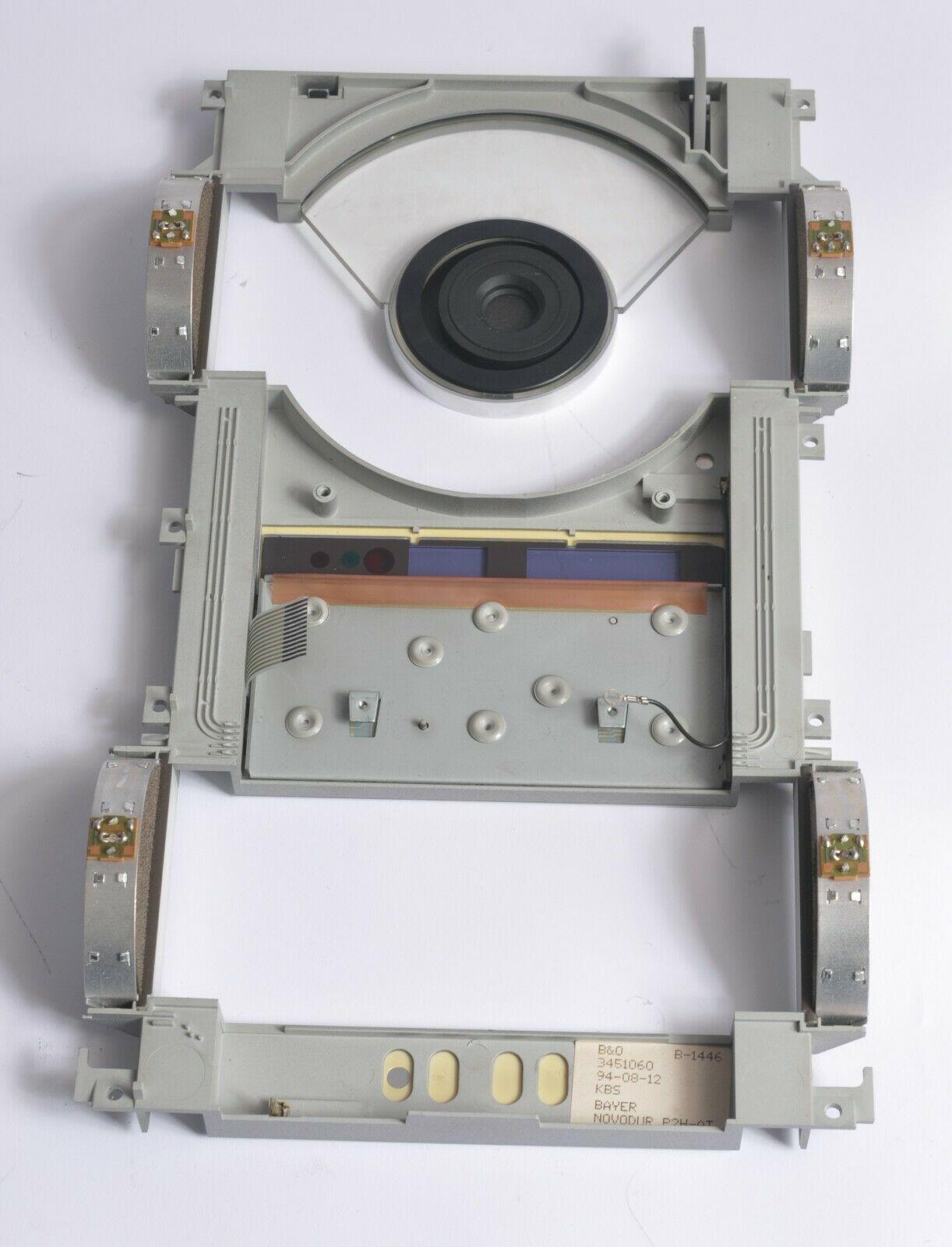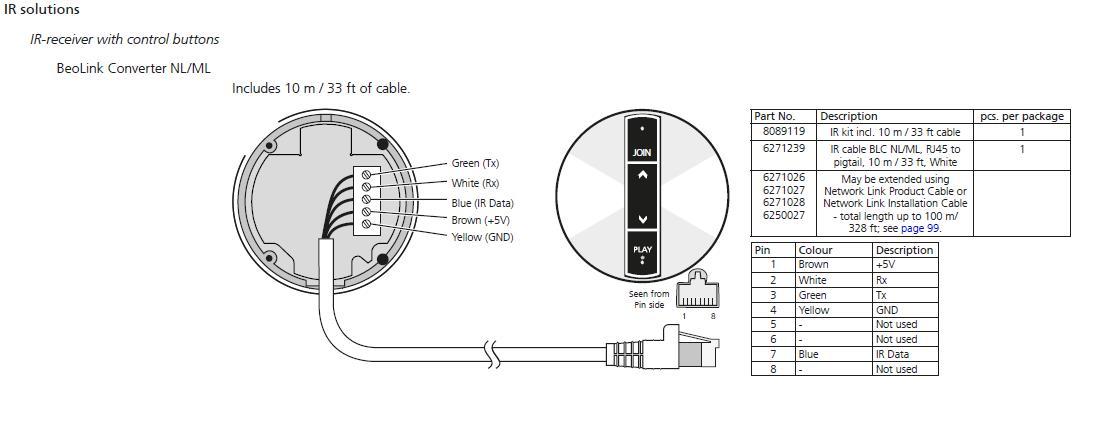Guy
Forum Replies Created
- AuthorPosts
-
Thanks a lot, Guy. It worked!
Great – thanks for letting us know, and enjoy your TV ?
Firstly, I rotated your photo for ease!
Can you identify these remotes? What is the proper name for the working but for me useless ”video terminal” device?
They were initially all part of the Beolink 1000 family of remotes, and you can read about them here: https://beoworld.co.uk/prod_details.asp?pid=689
Would it [the V Terminal] be of use to anyone or is it only working with ancient thick CRT TVs?
The V.Terminal is probably mainly of interest to collectors (like me!) It will work with modern TVs and audio systems as it has the same IR codes, but the sources are a bit limited. That said, it is unusual to have a direct AUX button so some people may want it for ease of use with AUX sources.
If it is of use for any products still of interest I will place an ad for it. I guess I will put the others in the bin. They both bear witness of leaking batteries.
If you have no use for them I would probably put all but the right hand one on eBay, possibly as a job lot. The V Terminal may attract a collector and the non-working remotes will be attractive for ‘spares or repair’. Be honest in the description and maybe show photos of the battery compartments so that bidders know what they are getting.
Assuming that you have a remote (Beo4), you’ll need to go into the TV SETUP, then OPTIONS, then CONNECTIONS menu, choose the socket to which you have connected the adaptor (AV1, 2 etc) and ‘tell’ the TV what is connected. In this process you also choose what button on the Beo4 you then use to select that specific input. It’s probably best to use V.TAPE or V.MEM if you don’t use these buttons to select anything else.
Have a play with the options and come back to us if you get stuck!
It’s a bit tricky, hence well worth having a look in the ‘user’ or ‘reference’ manual of your TV, which you can probably find on an internet search or by joining Beoworld as a Silver or Gold member!
To add to the above – here’s a picture that I found a while back showing the reverse of the keypad – you can see the eight plastic rivets that need chiselling off as part of the repair. You can also see the contact foil emerging from the left hand side.
(The picture is actually a BC2500 (with cassette player) but the keyboard assembly is identical)

Keyboard failures are quiet common in the BC2300/2500/Ouverture series. Repairing the keyboard in my BC2300 was my very first B&O fix about 12 years ago.
The tracks in the contact foil may well have failed – the faulty buttons share a contact foil track (together with STOP, RECORD and RETURN) so that may well be your problem. B&O actually released a repair kit to resolve this. You need to disassemble the unit to get to the keyboard, and the repair involves cutting the rear of some plastic rivets that hold the keyboard assembly together. These rivets are then replaced with small screws in the repair kit. It’s actually quite straightforward once you have the kit, service manual and instructions.
I will attach a copy of the repair kit instructions for info.
Great – thanks for letting us know that it worked, and enjoy your Beosound! ?
Perhaps the BS3000 is in A.OPT 0 where it doesn’t respond to IR codes.
To put it in A.OPT 2: (carry out with the BS3000 at standby)
On the Beo4, press the POWER (red) button and LIST together. Then press LIST until OPTION is shown, press GO (centre button), and then press LIST to show A.OPT. Then press 2.
Now see if it works!
@ Flobuher – just want to let you know that I merged your post with the earlier thread as this device had already been mentioned.
It’s given me chance to try out the moderators’ ‘merge’ function for the first time, so no harm done ?
Perhaps the BL3500 is in L.OPT 0 where it doesn’t respond to IR codes.
To put it in L.OPT 2:
- If using Be0link 1000 remote, press LINK 2 STORE.
- If using Beo4, press the POWER (red) button and LIST together. Then press LIST until OPTION is shown, press GO (centre button), and then press LIST to show L.OPT. Then press 2.
Now try MENU MENU 04 GO again.
Have a look at this thread: https://archivedforum.beoworld.co.uk/forums/t/6702.aspx
Perhaps you have ‘Timer Off’ showing on the display, or perhaps you have connected your speakers to the wrong speaker socket.
Why don’t you use a ‘beolab trigger cable for this? Soundsheavenly makes them. powmasscables makes them. Or make it yourself. Put 2.5~5v on pin 4 and pin 7 for ground and all beolab speakers switch on…
I am sure Steve will correct me if I am wrong, but I understand that these ‘trigger cables’ require manual intervention from the user to switch the speaker on. They don’t auto-sense the audio signal and then provide 5v to the PL pin.
I interpreted that KolfMAKER is looking for an automatic solution, hence the links provided in my posts.
Hi and welcome to Beoworld!
The remote pictured is an Audio Terminal – the BeoLink1000 has a different button layout, most noticeably a LINK or LIGHT button as the top centre button.
The B&O Audio Terminal send the same IR codes as the BeoLink1000 which itself sends the same codes as the Terminal 3300 which was supplied with the BM3300. Hence your remote should work with your system.
To check if the remote is transmitting, view the end with a smartphone camera and you should see faint lights (compare with a known working non-B&O remote). On an iPhone, you may need to use the front facing selfie camera because the main camera may not detect IR.
August 23, 2022 at 8:44 am in reply to: App Control of Masterlink Products Using Beolink Converter NL/ML #7911Thanks Gregg. Sounds promising – something for me to research further before deciding what to go for, and probably better than NL/ML converter if I also want a degree of home automation. Once I have investigated I may well be back with further questions!
August 22, 2022 at 8:43 pm in reply to: App Control of Masterlink Products Using Beolink Converter NL/ML #7900Thanks Johan! I haven’t purchased a converter yet, hence wanted to do a little research before getting hold of one. To be honest I don’t even have a masterlink setup currently because I am temporarily in a rental house, but wanted to start building up some ideas for a future system. It all sounds promising so I think I’ll start with one converter and take it from there. It’s only a matter of time before I get hold of an NL product, so it’ll be worth having in the longer term.
August 22, 2022 at 2:09 pm in reply to: App Control of Masterlink Products Using Beolink Converter NL/ML #7878Many thanks indeed Paul – that’s useful to know.
It’s the same as the one for the Beolink Converter NL/ML:
(click on image to make larger and clearer!)

Maybe something like this (the 5V trigger version) would be suitable: https://www.ebay.co.uk/itm/173940637592
I don’t think there’s an easy way to do it, however some thoughts:
- Perhaps you could connect the audio out of the wireless receiver to the aux input of one of these: https://shop.oneremote.dk/shop/69116-powerlink-aux-adaptor/4154-powerlink-aux-expander/
- Alternatively you could use a Playmaker. This will auto-sense a line input and switch on the PL output.
- Maybe you could take/modify the circuitry from a Beolab that already has an auto power on trigger – such as Beolab 4.
EDIT: I only considered ‘automatic’ options. It would be relatively easy to do if you are prepared to flick a switch each time you want it on!
August 20, 2022 at 6:23 pm in reply to: BeoCenter 2300 AUX input from DAC line-out low volume? #7826However, when I connect the RCA to Aux cable to the Topping’s stereo line out, I get barely audible sound from the Beocenter (at volumes 40+).
Are you sure that the RCA to 7-pin DIN cable is wired as an input at the DIN end? (i.e to pin 3 and 5, not 1 and 4)
I would like to see if it is possible to use a CAT-7 cable and add a USB-C, ethernet and a mini-jack connection at both ends of the same cable, without distorting the signals?
My understanding is that if you are not running gigabit ethernet (or PoE) then there are potentially two spare twisted pairs in CAT7. I reckon you could possibly pass analogue audio or power over the spare connectors but not both. I think the usb c power connection may be a problem because usb c uses the other data pins to confirm power requirements etc – it is not just a dumb voltage supply.
It could well be worth experimenting, in which case get some of these to make it easier to swap connections around. Also, I would find some cheaper experimental devices rather than trialling with B&O equipment!
(I was once going to trial passing ethernet to a smart TV over a spare in-wall hdmi cable – it may well have worked but I never got past the concept stage and have since moved house)
- AuthorPosts
